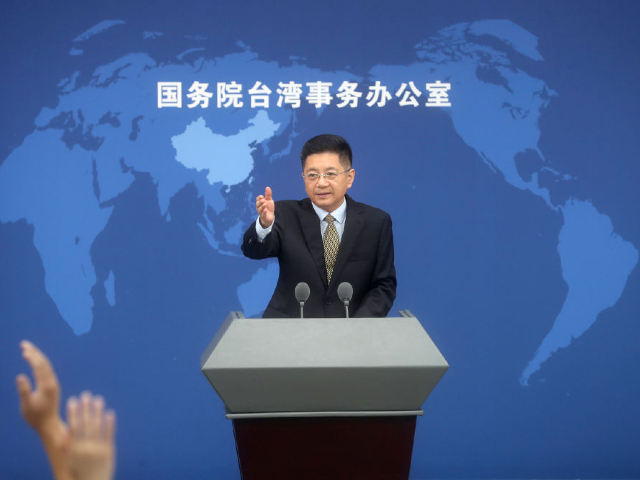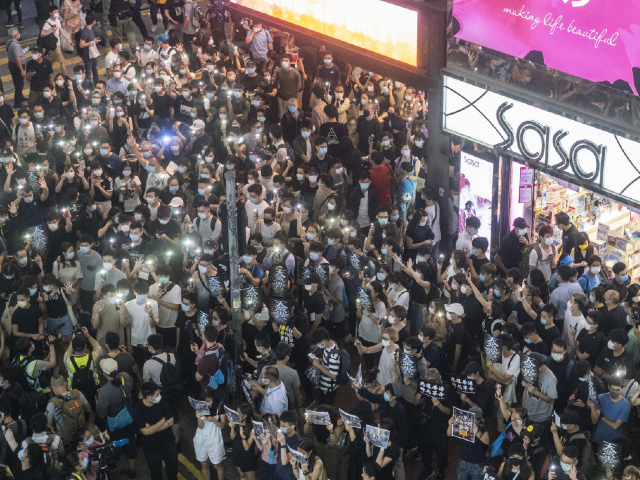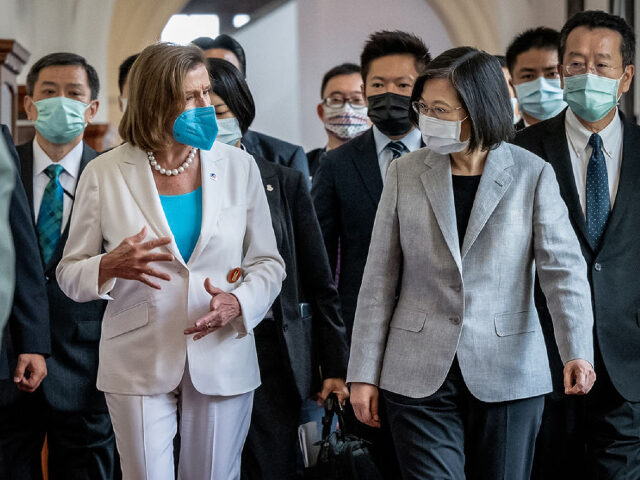China’s “Taiwan Affairs Office” declared on Thursday that the solution to tensions between the two countries is the colonization of Taiwan through “One Country, Two Systems,” the policy Beijing promised to abide by in Hong Kong but flagrantly crushed in response to pro-democracy protests in 2019.
The Chinese Communist Party has engaged in a ceaseless campaign of complaints, military belligerence, and violent threats since Speaker of the House Nancy Pelosi (D-CA) spent 19 hours in Taipei last week, meeting with Taiwanese President Tsai Ing-wen, senior Taiwanese lawmakers, and human rights leaders. Pelosi and her small Congressional delegation insisted that their presence in the country was not an attempt to change the “status quo” in which the United States does not formally recognize Taiwanese sovereignty, but Beijing has branded her visit a dangerous threat to China’s territorial integrity.
Taiwan is a sovereign country off the coast of China, with independent government, military, and social institutions. Taiwan has never been governed by a regime based in Beijing in its history. Despite this, the Chinese Communist Party insists that Taiwan is a “province” of China and forces countries that wish to have diplomatic ties with Beijing to not formally recognize Taiwan’s statehood. China also bullies international institutions like the World Health Organization (W.H.O.) out of allowing Taiwan to join – a move with particularly disastrous results in late 2019, when Taiwan attempted to alert the W.H.O. of the discovery of a novel infectious disease in China but was “mostly ignored.”
Contrary to friendly promises of autonomy on Thursday, Chinese Communist leaders have routinely threatened to kill anyone recognizing the independence of Taiwan.
“Anyone who attempts to split any region from China will perish, with their bodies smashed and bones ground to powder,” Chinese dictator Xi Jinping promised in 2019, referring to the Taiwanese government, pro-democracy Hong Kong protesters, Tibetan activists, and the Uyghur population of occupied East Turkistan.
Polls indicate that annexation into China is highly unpopular in Taiwan, including under the alleged autonomy of the “One Country, Two Systems” policy. In addition to the rejection of China’s routine violent threats, the Communist Party’s effective elimination of “One Country, Two Systems” with the passage of a “national security law” forbidding political dissent in Hong Kong has also fueled distrust in Taipei.
“The legal fact that Taiwan is a part of China is clear and unambiguous,” Ma Xiaoguang, a spokesman for China’s Taiwan Affairs Office of the State Council, told reporters on Thursday, according to the state-run Global Times newspaper. “Although the island has not yet been fully reunified, China’s sovereignty and territory has never been divided and never will be, and Taiwan’s status as part of China has never changed and will never be allowed to change.”

BEIJING, CHINA – JUNE 29: Ma Xiaoguang, spokesperson for the Taiwan Affairs Office of the State Council, attends a press conference on June 29, 2022 in Beijing, China. (Photo by Zhang Yu/China News Service via Getty Images)
The Global Times paraphrased Ma as saying that “‘peaceful reunification’ and ‘one country, two systems’ show how the mainland [China] values cross-Straits peace and well-being of people across the Straits.”
China “is willing to continue uniting compatriots in Taiwan and actively explore the Two Systems solution to the Taiwan question and make innovative efforts toward peaceful reunification,” Ma said.
Ma then accused the legitimate government of Taiwan of practicing terrorism by existing and promoted a “white paper” written by the Chinese government proclaiming Beijing’s intent to impose “One Country, Two Systems” on Taiwan.
“One Country, Two Systems” is, nominally, a policy implemented in Hong Kong which required the region not to pursue sovereignty and allow itself to be claimed by Beijing. In exchange, the Communist Party was supposed to allow Hong Kong to write its own laws. In theory, Communist Party laws do not apply in Hong Kong, meaning the city could engage in capitalist, democratic rule.
In 2019, China moved to crush “One Country, Two Systems” by proposing a law that would allow China to extradite anyone present in Hong Kong into China if accused of violating communist laws, essentially making those laws valid on Hong Kong soil. The move inspired a massive protest movement attracting millions of peaceful marchers demanding respect for the “One Country, Two Systems” policy. The Communist Party responded to the protest movement by arresting or exiling its leaders and implementing, illegally, a “national security” law passed in Beijing that prescribes a minimum of ten years in prison for individuals convicted of “terrorism,” “secession,” seeking “foreign interference,” or “subversion of state power.”

Demonstrators shine lights from their smartphones during a protest in the Causeway Bay district of Hong Kong, China, on Friday, June 12, 2020, on the anniversary of the illegal imposition by the Communist Party into the autonomous city of Hong Kong. Photographer: Justin Chin/Bloomberg
To prevent the development of new protest movements, China has replaced school textbooks in schools with pro-regime propaganda and rewritten kindergarten curricula to add learning experiences such as “National Security Education Day” for five-year-olds.
The Taiwanese government enthusiastically rejected the call for “One Country, Two Systems” from the Communist Party.
“It has long been a mainstream opinion in Taiwan that one country, two systems is unacceptable and is not an option for Taiwan,” Taiwan’s Mainland Affairs Council said in a statement on Thursday. Taiwanese Foreign Ministry spokeswoman Joanne Ou also condemned Beijing for increasing tensions between the two countries in remarks to reporters.
“China has repeatedly staged provocative actions, including sabre-rattling drills, cyberattacks and disinformation to try to coerce Taiwan in recent days,” Ou denounced, “and even released its so-called policy white paper towards Taiwan to promote its so-called grand mission of unification with the motherland.”
“The content of the white paper not only ignores the long-time fact that the two sides of the Taiwan Strait do not belong to each other but also violates international law and Taiwan’s sovereignty … and for this, we express our solemn protest and condemnation,” Ou concluded.
The Mainland Affairs Council has organized polls for years showing widespread rejection of “One Country, Two Systems” in Taiwan. A poll taken in March 2019, shortly before the eruption of the Hong Kong pro-democracy protest movement, found that 79 percent of Taiwanese oppose the policy.
“In addition, nearly 90% of the public believe that Taiwan’s future and the development of cross-Strait relations should be decided by the 23 million people of Taiwan (87.7%),” the Council revealed in 2019, affirming that Taipei would soundly reject any attempt to strip the country of its sovereignty.

COMMENTS
Please let us know if you're having issues with commenting.